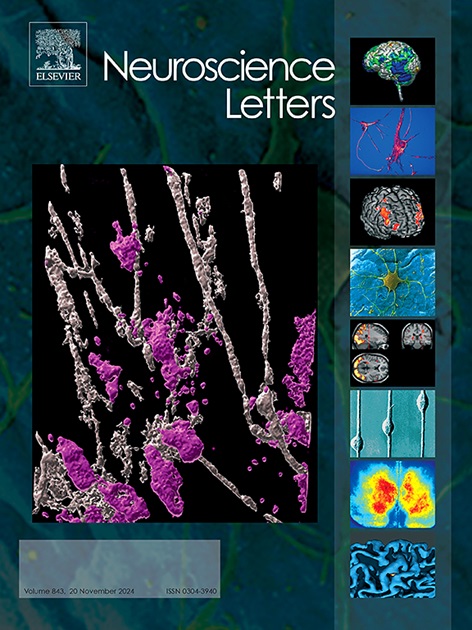Evaluation of the effect of biperiden (cholinergic muscarinic receptor antagonist) on ethanol self-administration in rats
IF 2.5
4区 医学
Q3 NEUROSCIENCES
引用次数: 0
Abstract
Evidence from the literature suggests that alcohol use disorder (AUD) is closely associated with alterations in neuronal plasticity and the memory system, related to modifications in muscarinic receptors. The present study aimed to investigate the effects of systemic injection of biperiden, a muscarinic cholinergic antagonist, in experimental protocols of progressive ratio, 24-hour binge alcohol consumption, and reinstatement of context-induced ethanol self-administration. The results demonstrated that biperiden at doses of 5 and 10 mg/kg (i.p.) effectively reduced the animals’ motivation for alcohol consumption, as evidenced by decreased responses on the active lever and a reduction in the last ratio achieved in the progressive ratio protocol. Furthermore, these same doses significantly reduced ethanol consumption in the 24-hour binge protocol. Treatment with biperiden at doses of 1, 5, and 10 mg/kg also attenuated alcohol-seeking behavior after re-exposure to the context associated with ethanol self-administration. These findings suggest that biperiden may have therapeutic potential in the treatment of alcohol use disorder, indicating that modulation of the cholinergic system could be a promising avenue for further investigation.
胆碱能毒蕈碱受体拮抗剂biperiden对大鼠乙醇自我给药作用的评价
文献证据表明,酒精使用障碍(AUD)与神经元可塑性和记忆系统的改变密切相关,与毒蕈碱受体的改变有关。本研究旨在探讨全身注射biperiden(一种毒蕈碱类胆碱能拮抗剂)在进行性比例、24小时狂饮和恢复情境诱导的乙醇自我给药实验方案中的作用。结果表明,5和10 mg/kg (i.p)剂量的双剑草有效地降低了动物的饮酒动机,这可以从主动杠杆的反应下降和渐进比例方案中达到的最后比例降低中得到证明。此外,这些相同的剂量显著减少了24小时暴饮方案中的乙醇消耗量。以1、5和10 mg/kg剂量的双倍藤碱治疗也能减轻再次暴露于与乙醇自我给药相关的环境后的觅酒行为。这些发现表明,双盆草可能在治疗酒精使用障碍方面具有治疗潜力,表明调节胆碱能系统可能是进一步研究的有希望的途径。
本文章由计算机程序翻译,如有差异,请以英文原文为准。
求助全文
约1分钟内获得全文
求助全文
来源期刊

Neuroscience Letters
医学-神经科学
CiteScore
5.20
自引率
0.00%
发文量
408
审稿时长
50 days
期刊介绍:
Neuroscience Letters is devoted to the rapid publication of short, high-quality papers of interest to the broad community of neuroscientists. Only papers which will make a significant addition to the literature in the field will be published. Papers in all areas of neuroscience - molecular, cellular, developmental, systems, behavioral and cognitive, as well as computational - will be considered for publication. Submission of laboratory investigations that shed light on disease mechanisms is encouraged. Special Issues, edited by Guest Editors to cover new and rapidly-moving areas, will include invited mini-reviews. Occasional mini-reviews in especially timely areas will be considered for publication, without invitation, outside of Special Issues; these un-solicited mini-reviews can be submitted without invitation but must be of very high quality. Clinical studies will also be published if they provide new information about organization or actions of the nervous system, or provide new insights into the neurobiology of disease. NSL does not publish case reports.
 求助内容:
求助内容: 应助结果提醒方式:
应助结果提醒方式:


